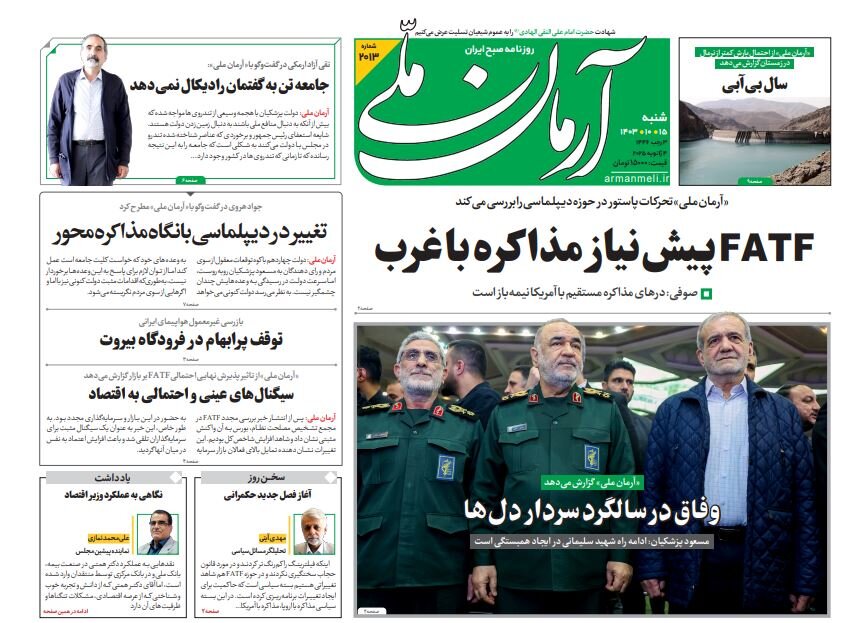The year of negotiations with America
The year of negotiations with America?
TEHRAN - Arman-e-Melli analyzed possible negotiations between Iran and the U.S. and wrote: It must be said that the beneficiaries of the sanctions are not the only ones who are trying to create obstacles on the way to the negotiations.

Israel is also against any negotiations with Iran that would break the deadlock. Israel has proven that it will take any action it can to remove Iran from the nuclear negotiations table; and secondly, not to allow negotiations to to reduce the tension between Iran and the United States. It seems that the level of future negotiations is related to the non-constructive positions of the European troika, some human rights issues, and Europe's claims related to the export of Iranian missiles and drones to Russia. The tactical mistake of the previous government was that they shifted the nuclear negotiations from Europe to certain regional Arab countries. This situation is expected to be rectified because the role of Europeans is key in this regard. It is never too late to negotiate, even at the height of the political tensions that the opponents of the Islamic Republic have created for Iran so that they can have the upper hand in facing Tehran in peace and war.
Keyhan: America's goal in negotiations is to restrain Iran, not to lift sanctions
In a note, Kayhan discussed the admissions by American analysts including Richard Nephew, John Hoffman, and Barak Ravid that an attack on Iran’s nuclear facilities will not work. It said: The admissions by these politicians is on the possible failure of the West in the event of any potential attack on Iran's nuclear facilities and their proposals for negotiations are intended to restrain our country and force it to back down from its nuclear position. They believe that any military attack on Iran's nuclear facilities will have a low possibility of success and will complicate the nuclear dispute between Iran and the West. The fact is that the Americans were well aware of the consequences of attacking Iran's nuclear facilities. They also see negotiation and agreement not in the direction of resolving tensions, but more in the direction of undermining Iran's foreign policy and its national power. The Americans are well aware that any attack, in addition to Iran's response to American forces in the region could prompt Tehran to change its nuclear doctrine.
Ettelaat: What is the ideal agreement for Iran and Trump?
Ettelaat conducted an interview with Rahman Ghahremanpour about a possible agreement between Iran and Trump’s administration. He said: Trump has faced a situation in the Middle East that could affect his main policy of containing China. Trump's second administration does not have the opportunity to focus on the Middle East as much as his first administration, and the Gaza war has caused the U.S. government to get unintentionally involved in Middle East conflicts. Trump wants to distance himself from the Middle East as quickly as possible. For this, the Iran issue must be resolved in Washington. Trump is seeking to reach a comprehensive agreement with Iran that will reduce America's concern about Iran and make sure that Iran does not get a (atomic) bomb and does not threaten Israel through the Axis of Resistance. Iran is looking for a chance to maintain its nuclear power and to see the least damage from the ongoing developments in the region. It seems that in the current situation, there is a big gap between what is the desired agreement between Iran and America and the optimism.
Iran: Two important cases of Tehran’s foreign policy
Iran wrote Iran’s foreign policy priorities are now interacting with the Trump administration and resolving the nuclear dispute. The results of each of them will have long-term effects on the country. Regulating the relationship with the Trump administration and focusing on developments in West Asia are more sensitive and should be given more priority than the nuclear dispute. The country's decision-makers must come to a clear conclusion as to whether negotiations with Trump's administration will meet national interests or will not achieve anything. If the decision to negotiate and solve the problems with America is within the framework of diplomacy and adopting a kind of literature that is appropriate in international relations and international law to advance the goals of meeting national interests is an absolute necessity. But if, for any reason, the country's decision-makers conclude that it will be impossible to solve issues with the U.S., especially regional issues, the nuclear case must center on interaction with Europe and the IAEA to prevent the JCPOA parties from moving to a snapback mechanism.
source: tehrantimes.com